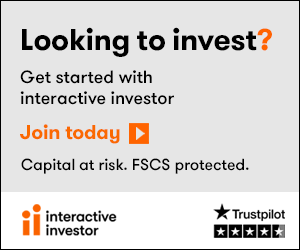When you start investing, you ideally want to keep your portfolio as diversified as possible. Two ways to do so are to invest in an investment trust or an exchange-traded fund (ETF).
However, you may be asking yourself: investment trust vs ETF, what are they and what’s the difference? My article will help you discover everything you need to know about the two, and why you may want to think about investing in one, or both, of these types of assets.
Also consider: Guide to ETFs for UK investors
Key takeaways
- The main difference between ETFs and investment trusts is that an ETF typically tracks the performance of a market or another equity, whereas an investment trust is a type of pooled fund that invests in different companies and assets.
- Investment trusts have a relatively cost-effective fee structure, while ETFs usually have management fees.
- With an investment trust, your money is managed by financial professionals whose investments dictate the performance of the trust, while the performance of an ETF is decided by the asset it’s tracking.
- Investment trusts tend to pay decent dividend yields – ETFs still offer dividends, though the yields tend to be lower.

What are the benefits of an investment trust?
Simply put, an investment trust is a type of pooled investment, much like mutual funds. Unlike other funds, however, investment trusts are official companies listed on a stock market, such as the London Stock Exchange.
What are the benefits of buying shares in an investment company like this? Continue reading to find out.
Access to a wider range of investments
When you purchase shares in an investment trust, financial professionals manage and invest your money.
Since these managers want to minimise the amount of risk their investments are exposed to, they will tend to diversify their portfolios.
This means, in essence, by buying shares in this one investment company, you are really investing your money in a wide range of different companies and assets.
Cost-effective fee structures
One of the useful things about investment companies is the cost-effective fee structures they typically have.
Usually, the only thing you need to pay is an ongoing charge, which is typically the estimated annual charge of holding the investment trust. This covers things like portfolio management, director’s fees, and audit fees.
Of course, since investment trusts issue shares and generate capital through selling them, you may face trading fees for purchasing these shares.
This could vary depending on your trading platform. Read my guide on the best investment apps if you would like to find out more about the different trading platforms on offer.
Your money is managed by financial experts
The fact that investment trusts are managed by financial experts makes them ideal for passive investors or those that aren’t as confident in making their own investment decisions.
The fund managers making the investment decisions will usually be far more proficient in their knowledge of markets and trading. This increases the chances your money is invested wisely.
They usually pay good dividend yields
Since investment trusts are listed companies on the stock exchange, they pay out dividends to investors.
Better yet, since investment trusts are allowed to hold back 15% of the income their investments generate each year, they can use this money to ensure dividends are paid to investors during less lucrative periods.
When you receive dividends, you can then make the decision to reinvest them automatically or to receive them as income.
What are the downsides to an investment trust?
While the good dividend yields and instant diversification can offer a great investment opportunity, investment trusts also come with some downsides that you should keep in mind.
What are these downsides though? Read on to find out more.
Prices could be slightly higher than the trust’s constituent companies
As mentioned, an investment trust is a listed company on the stock exchange that issues shares and sells them. Due to this fact, you may end up paying more for shares in an investment trust than you would for shares in the individual constituents.
This is all down to supply and demand – when there are fewer shares on offer, prices are driven up, which is called a “premium”.
Supply and demand can work both ways though, so it is possible to buy shares at a price lower than the net asset value (NAV), which is called a “discount”.
Gearing can cause some volatility with investment trust values
Gearing is the ratio of a company’s debt-to-equity. It shows the extent to which a company’s operations are funded by lenders versus shareholders, sometimes called financial leveraging.
One of the features of investment trusts is that they can gear their shares. While this does increase the possibility of gains since it allows trusts to borrow at favourable rates of interest, it also can magnify loss and create volatility due to increased exposure to the market.
What are the benefits of ETFs?
Exchange-traded funds (ETFs) are a popular choice for investors looking for a different way to diversify their portfolios. An ETF tends to track a basket or selection of companies, indices, government bonds, or another group of similar assets.
What are the benefits of investing in such a fund? Keep reading to find out everything you need to know about ETFs.
You can choose from a wide variety of different ETFs
Instead of pooling money and then making investments with it, ETFs instead track a single instrument.
For example, there are ETFs that track stock indices such as the FTSE 100, some that track commodities, and some that even track market volatility.
The huge variety of different ETFs on offer gives you a vast amount of choice when it comes to deciding how your money is invested.
ETFs are much more tax-efficient
When it comes to tax, ETFs are typically more tax-efficient than investment trusts. You will typically have to pay Capital Gains Tax (CGT) on any gains your ETF investments generate that exceed your CGT annual exempt amount, sitting at £12,300 in the 2022/23 tax year.
But depending on the type of ETF, the other types of tax you may have to pay will vary.
For example, if your chosen ETF follows equities, you may have to pay Dividend Tax, but not Income Tax.
Meanwhile, an ETF that tracks bonds may be liable for Income Tax, but not Dividend Tax.
ETFs that track commodities, however, typically don’t have to pay either Income Tax or Dividend Tax.
The amount of tax you have to pay will depend on your personal circumstances, whether your investments are held in an ISA, and any remaining tax allowances and exemptions you have.
Exchange-traded funds (ETFs) tend to be lower risk
Since exchange-traded funds tend to track an index or group of companies, the risk involved with investing in ETFs tends to be lower.
This is because they track a group of companies or equities so, if there’s a market downturn for a certain sector or industry, there’s less chance that all the ETF’s constituent companies would lose value.
For example, if tech stocks were performing poorly, a FTSE 100 ETF might not decrease in value as much as an individual tech stock since it tracks companies in sectors other than the tech industry.
Bear in mind that this is not guaranteed, and all the constituents could still lose value at once. Indeed, a FTSE 100 ETF would likely lose value if the entire UK market were to experience a downturn.
What are the downsides to ETFs?
Of course, all that glitters is not gold, and ETFs are no exception. While they may seem like a great investment choice, there are some downsides you should remember before you invest.
Keep reading my article to find out what these downsides are.
An ETF tends to be less diversified
As mentioned, ETFs typically track a single instrument, such as a stock index like the FTSE 100 or specific assets such as government bonds.
While this does have its upsides, only tracking an individual instrument means that investing in an ETF will offer less portfolio diversification than you might receive from an investment trust.
You could face higher costs with an ETF
If you were to invest in an ETF that tracks a stock index, there is a chance that you will face higher costs than you would from investing in the index’s constituent companies.
On top of any trading fees you may have to pay, you may also have to pay a management fee. This will vary between different ETFs.
ETFs typically pay lower dividend yields
If earning through dividends is your goal for investing, then ETFs may not be for you. While some ETFs do pay dividends, the yields are unlikely to be as high as investing in investment trusts, or even individual stocks.
This is because an ETF tends to track the broader market, which results in a lower dividend yield. Of course, this is countered by the fact that they tend to be lower risk.
Also consider: How to buy gold stocks and the best gold ETFs UK
eToro
- Compare top ETFs on an innovative and user-friendly platform.
- Get $100,000 to practise and improve your trading skills.
- Automatically copy top-performing investors in real time with CopyTrader™
{etoroCFDrisk}% of retail investor accounts lose money when trading CFDs with this provider. You should consider whether you can afford to take the high risk of losing your money. Your capital is at risk. Other fees apply. For more information, visit etoro.com/trading/fees
An introduction to investment trusts
An investment trust is another type of fund, much like unit trusts or mutual funds, which involves pooled investments.
The thing that sets investment trusts aside from other types of funds, however, is that an investment trust is an official company listed on the stock market whose sole purpose is to invest on behalf of their investors.
One example of an investment trust in the UK is Alliance Trust.
How exactly do investment trusts work?
When you invest in an investment trust, you are, in essence, entrusting your money to experienced financial professionals to invest for you.
The fund manager will aim to generate a return for the trust’s investors, typically spreading investments across many different markets and sectors to ensure portfolio diversification.
Since investment trusts are public companies listed on the stock market, they issue shares to sell, much like traditional companies. Investors that buy these shares can then make gains by selling the trust’s shares if they rise in value, or by collecting dividend payments.
Are investment trusts a good investment?
If you are looking to diversify your portfolio and earn an income through dividends, then an investment trust might be exactly what you’re looking for.
They could also be better for less confident investors, since all investment decisions are made by professionals. That means you can have the peace of mind that a professional has a handle on your money when you invest in a trust.
What are the dangers involved with investment trusts?
Whatever it is you’re investing in, be it investment trusts or individual companies, there is always risk involved.
While investment trust managers do diversify and try to limit their exposure to risk through smart investments, no one can perfectly predict how the markets will perform. So, the value of your investments could decrease as well as increase.
Even if you’ve diversified your portfolio well and done everything you can to mitigate risk, a sudden downturn that no one expected can still damage the value of your investments. Covid, for example, was very unexpected and had serious detrimental effects on global markets.
An introduction to ETFs
Exchange-traded funds (ETFs) are funds that track an index or specific equity. For example, a commonly traded ETF would be one that tracks the FTSE 100 share index.
ETFs aren’t just limited to stock indices either, as they can track various different assets, including:
- Sectors
- Commodities
- Government bonds
- Volatility
- Specific investment strategies.
As you can see, you have a great spread of choices when it comes to investing in ETFs.
How exactly do ETFs work?
An ETF is traded on the stock market much like individual company shares, and the price fluctuates throughout the trading day.
The value of an ETF is decided by the performance of the securities it tracks.
Are ETFs a good investment?
ETFs can be great long-term investments for those who want to invest passively. The diversification on offer also makes them a useful investment tool for those looking to spread their investments and minimise risk.
Of course, while ETFs do tend to be lower-risk investments as they track a set of securities, there is always risk involved.
How do ETFs compare to other types of funds?
ETFs are quite similar to other types of index funds, though they do come with their own set of benefits.
For example, ETFs tend to be far more cost-effective than other types of funds, which usually have higher transaction costs.
The liquidity of an ETF is also a great benefit, as you can buy and sell an ETF at any time of the day, while most funds only execute trades at the end of the day. For example, you might ask a fund to sell you 100 units at 10 am, but the actual trade won’t go through until the market closes.
Meanwhile, being able to trade ETFs at any time of the day can benefit those who want to take advantage of smaller price swings throughout the day.
Which is better: investment funds or ETFs?
Overall, the question of which is better will come down to your personal circumstances and investment goals.
When it comes to costs, you will typically be required to pay more for an ETF than you would an investment trust. For an investment trust, you will typically face an annual fee that covers everything, whereas there may be trading fees and management fees with ETFs.
If you’re looking to make an investment that offers good dividends, an investment trust may be a good choice for you. Investment trusts can hold back 15% of generated income and use it to pay dividends in less lucrative years.
Meanwhile, although ETFs tend to offer lower dividend yields, they’re typically more tax-efficient than other types of funds or trusts.
As you can see, investment trusts and ETFs both have their own positives and negatives, so the best one for you will depend on your investment style.
Investment trust vs ETF FAQs
What are the main differences between investment trusts and ETFs?
Investment trusts are actively-managed funds that pool investors’ money together, then invest that money in different securities. Returns from those investments are then paid back to investors in the form of dividends, and the value of the investment trust increases if their investments perform well.
ETFs, however, are a type of fund that track a set of securities, such as stock indices or commodities. The performance of an ETF depends wholly on how its tracked security is doing, and while they tend to pay out lower dividend yields, they can be sold when they are performing well.
Do investment trusts perform better than ETFs?
In general, investment trusts tend to outperform open-ended funds. The fact that you can purchase shares in an investment trust at a discount can also help boost your returns.
You should keep in mind though that investment trusts tend to be more volatile than ETFs.
Please note
The value of your investments (and any income from them) can go down as well as up and you may not get back the full amount you invested. Past performance is not a reliable indicator of future performance. Investments should be considered over the longer term and should fit in with your overall attitude to risk and financial circumstances.



